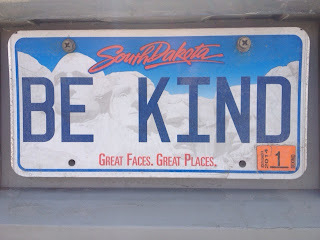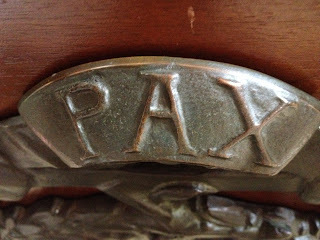incarceration
Surveillance and Virtue
These are signs that our technology is racing ahead of us. It is easier to create new machines for surveillance than it is to devise a set of rules for ethical use of those machines. The problem of Google Glass is not something altogether new; but the technology sharpens the ethical issues: can I wear it in the locker room at the gym? Can I wear it while talking with the police, or border guards? Can I wear it at a party where co-workers are drinking?
The problem of drones is similar: we have increased our ability to watch others without being watched. As Foucault observed, this is one of the main functions of the prison, a relatively modern invention. The prison is an architectural technology that allows us to watch over our fellow citizens without having them watch us.
 |
| Be kind; love one another. |
We are unlikely to slow our own technological progress, so we must devote equal energy and resources to ethical reasoning and to ethical living. Here is where I suggest we start:
First, if you're ashamed of someone seeing what your community is doing, don't do it. It is one thing to protect trademarked secrets and patented methods of production, to enjoy the economic benefits of one's creativity. But if your reason for concealing your business process is that you know I won't buy your product if I know how it's made, you deserve to be exposed because you are manipulating me by concealing information that would affect my decisions.
Second, devote yourself to respecting the privacy and dignity of others. Do this not just for others, but for yourself. We know ourselves to be less than we wish we were; and we know that the social impulse is balanced in our species by a desire to do some things alone, unobserved, or only in intimate company. To expose those things unbidden is to dominate. It is crass, and unkind. If you do not respect others, the technologies of surveillance will become your Ring, and you will destroy your own soul.
At times these two principles will be in conflict with one another - underscoring the importance of continued ethical reasoning. We can't simply fall back on facile rules. We have got to keep thinking, and thinking hard, together. The simple principles, however, can provide a good place to start: do not attempt to dominate or destroy others. Put positively: love one another.
Love One Another: Prisons and Devotion to Enemies
This is a radical idea, one that is like the ideas of Jesus and St Paul that we should love our enemies. If your mind does not stumble over those words, you might be a saint; or you might not be listening to them.
King's argument is that we need our enemies. They need us to make them into the kind of people who embody love, not hatred. And we need - in the depths of our souls - the work of loving them in such a way that we win them over to the side of love and away from the crippling hatred that owns them.
It is easy to say "that's fine for church," or "I will love my enemy in my heart but in my life I will punish him." But what would happen if we thought of our worst enemies - I have in mind criminals and terrorists, the people we most seem to fear - as people with a "heart and conscience" that could be won. As people without whom we are incomplete.
We're good at finding ways to make people pay for their wrongdoing. We have great technology for warfare, and a brilliant system of criminal investigation and prosecution, perhaps the best history has ever seen. I don't propose eliminating those things. Instead, I am asking this: what if we decided that we would put the same creative energy and financial resources that have gone into creating our fine military, police, and courts into winning the consciences of our enemies?
When it comes to our anti-terror policies, I don't see what we can do to win terrorists' consciences, other than living our lives in such a way that anyone who supports our would-be enemies must feel shame at hating such virtuous people. That sounds to me like an end worth pursuing for its own sake, after all.
As for our prisons, our prisons seem to be good at exposing non-criminals to criminals; and to exposing criminals to more criminals, breeding gang culture. Violent criminals surely merit our censure, extraction from society, and punishment. But that doesn't mean our hearts need to be full of a desire for vengeance.
 |
| "Peace." Over the head of the angel of peace in Bruton Parish, Williamsburg, VA. |
I believe a society needs to be prepared to use force against those who would forcefully harm others. But increasingly I am coming to believe that individuals in each society also need to be prepared to fight fire not with fire but with the healing waters of love, waters that overflow from hearts that daily struggle to regard the people we most hate and fear as the people we also most need to love. It's not easy. But it may be the only way to become "a community at peace with itself."
Locking Up The Neighbors
South Dakota's prisons are nearly full to capacity, and the state was forced to choose between building more prisons and reforming its sentencing laws. The latter choice was the less expensive one, and that appears to be the main reason for the reform.
I've read that in the USA we now have more prisoners than farmers. I'm also told we have more prisoners than any other country in the world, and a much higher per-capita incarceration rate than any other developed country. Either we produce more criminals than other countries, or we are more aggressive in our incarceration policies.
I've argued before that our criminal code should not be devised along economic lines, but along the lines of love. Jens Soering similarly argues forcefully that our prisons are "an expensive way to make bad men worse."
We don't need to make men worse but to give them every opportunity to better themselves.
I'm not saying we shouldn't be tough on crime; we should be very tough on crime. But our current policies are not so much tough on crime as they are tough on criminals.
What I am saying is this: we should not regard criminals as people with a past but as people with a future. Many need to be incarcerated, yes, but if a man is to be locked up, let us lock him up as a neighbor. As they enter the prisons, let it be our first and guiding thought that they will soon emerge as our neighbors. And let us therefore do all we can to allow them to emerge as better men and women, not as worse ones.
Crime, Punishment, and the Great Community
-- Charles S. Peirce, 4 May, 1892
They Know It When They See It
An inmate in the South Dakota State Penitentiary has been denied access to art-instruction books because they contain images of unclothed human bodies. (Original story here and here.) While not everything that could be called an art book is a good art book, shouldn’t we be doing everything we can to help felons improve their lives? And isn’t art one of the best things they can do while in prison? Let us grant the prison wardens their claim that pornography worsens prison conditions; does that mean that all nudity is obscenity? (Scroll down to the concurring position of Mr. Justice Stewart.)
Every Time You Open A Prison...
…you close a school." - Victor Hugo.
“Why is it considered morally offensive and economically unwise in this country to give a poor person a few dollars more than $13.22 per day, but ethically appropriate and fiscally sensible to incarcerate a poor person at an average cost of $55.18 per day?” - Jens Soering, An Expensive Way to Make Bad People Worse. (Click here for Wikipedia’s article on Jens Soering.)
Hugo is obviously being provocative; education does not guarantee moral goodness. And Soering is similarly making a comparison that leaves out the important fact that criminals freely choose to commit their crimes. Nevertheless, good education does create opportunity, whereas inequality in education seems like an invitation to the poor to continue to consider themselves to be perpetually unequal to the wealthy and so perpetually unable to advance economically without crime.
Selah.